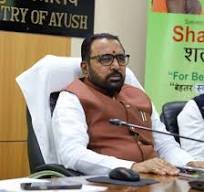New Delhi – The Ministry of Ayush has played a vital role in advancing preventive and curative healthcare across India by establishing a robust institutional structure. Through two statutory commissions—one for Indian systems of medicine and another for homoeopathy—the ministry regulates education and professional practice in Ayurveda, Unani, Siddha, Sowa-Rigpa, and Homoeopathy.
Twelve national-level teaching institutes have emerged as significant centres of integrated education and healthcare. These institutions offer a range of undergraduate to doctoral programs and provide both OPD and IPD services through accredited hospitals. Regular health camps and awareness drives are also organized, reinforcing their community outreach.
Five autonomous research councils support scientific progress in Ayush systems, managing a wide network of institutions. These councils conduct OPD and IPD services, implement Scheduled Caste and Tribal health plans, run school programs, and execute mobile clinical research. Additional institutions, wellness centres, and mind-body therapy hubs are functioning under separate Ayush councils to deliver comprehensive and holistic health services.
The Ministry operates a public sector undertaking to manufacture standardized Ayush medicines and has a central pharmacopoeia commission overseeing drug standardization and serving as a reference lab.
Under the National Ayush Mission, implemented in collaboration with state and union territory governments, the Ministry provides financial assistance for Ayush treatment facilities under approved action plans.
The government also encourages medical value travel in traditional Indian medicine. It has partnered with the Ministry of Tourism to promote international Ayush services, organized regional summits, and introduced a dedicated Ayush Visa category for foreign patients. The Medical and Ayush Visa Portal streamlines access for legitimate international patients and allows registered hospitals to issue necessary visa documents.
Efforts to build a skilled Ayush workforce include structured training and capacity-building programs through a scheme called ‘Ayurgyan.’ Programs promote continuing medical education and close knowledge gaps.
To boost global engagement, the Ministry runs an international cooperation scheme supporting Indian Ayush exporters and academic partnerships, including Ayush academic chairs abroad.
Research aptitude and skills are being fostered through student and postgraduate initiatives like SPARK, PG Star, Ph.D. fellowships, PRAYATNA for scientific writing, and ARMS training in research methodology.
National-level training for Ayush doctors has been conducted to promote the use of Standard Treatment Guidelines. Regulatory personnel and lab staff are also being trained in advanced techniques to ensure the quality of Ayush medicines.
National institutes and research bodies regularly organize workshops and training to enhance professional competencies across the Ayush sector.
This information was presented in a written reply by the Union Minister of State for Ayush, Shri Prataprao Jadhav, during today’s Lok Sabha session.



